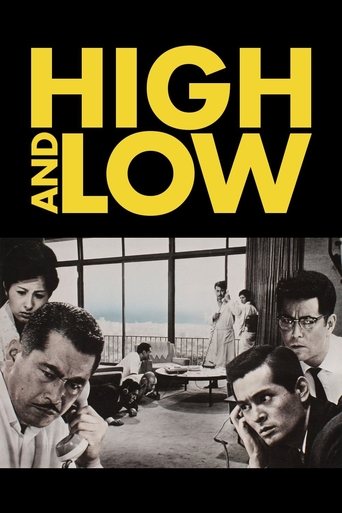De Akira Kurosawa, director de "Yojimbo" y "Sanjuro", llega una película tensa de un "crimen perfecto" moderno con más emoción de la que incluso Hitchcock podría crear.
"天国と地獄" (High and Low), released in 1963, is a gripping crime thriller directed by the legendary Akira Kurosawa and produced by TOHO and Kurosawa Production. The film is an adaptation of the novel "King's Ransom" by Ed McBain, masterfully transposed to the bustling cityscape of Yokohama, Japan. It delves into the stark contrast between the affluent and the destitute, a theme encapsulated in the film's title, which translates to "Heaven and Hell." Toshiro Mifune delivers a compelling performance as Kingo Gondo, a wealthy executive who faces a moral dilemma when his chauffeur's son is kidnapped instead of his own. The narrative unfolds in two distinct halves, mirroring the film's title. The first half is tense and claustrophobic, set almost entirely within Gondo's luxurious home as he grapples with the decision to pay the ransom. This segment is a masterclass in suspense, with Kurosawa's meticulous direction and the intense performances keeping the audience on the edge of their seats. The second half shifts to a more procedural style, following the police investigation into the kidnapping. Here, Kurosawa's attention to detail and his ability to weave a complex, engaging plot are on full display, as the detectives piece together the clues to track down the kidnapper. One of the film's most striking aspects is its social commentary. Kurosawa uses the kidnapping plot to explore themes of class disparity and moral responsibility. Gondo's decision to pay the ransom, despite the financial ruin it brings, is a poignant reflection on the values of compassion and justice over personal gain. The film also offers a stark portrayal of the lives of the less fortunate, particularly through the character of the kidnapper, whose backstory adds depth and a sense of tragedy to the narrative. "天国と地獄" remains a timeless masterpiece, not only for its thrilling plot and masterful direction but also for its profound social insights. Kurosawa's ability to blend genres, from crime thriller to social drama, while maintaining a cohesive and compelling narrative, is a testament to his genius. The film's exploration of the human condition, set against the backdrop of a rapidly modernizing Japan, continues to resonate with audiences today, making it a must-watch for cinephiles and social commentators alike.
Año1963
Presupuesto250000$
Duración142 minuto
GénerosDramaCrimenMisterio
Países de producciónJapan

